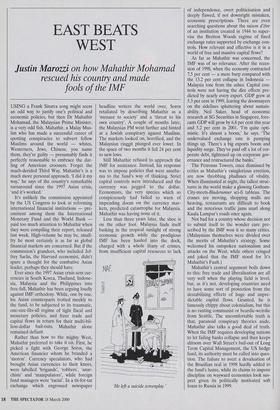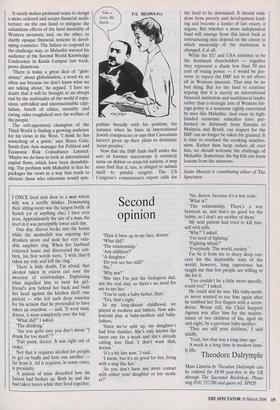EAST BEATS WEST
Justin Marozzi on how Mahathir Mohamad
rescued his country and made
fools of the IMF
USING a Frank Sinatra song might seem an odd way to justify one's political and economic policies, but then Dr Mahathir Mohamad, the Malaysian Prime Minister, is a very odd fish. Mahathir, a Malay Mus- lim who has made a successful career of spotting conspiracies to subvert fellow Muslims around the world — whites, Westerners, Jews, Chinese, you name them, they're guilty — presumably finds it perfectly reasonable to embrace the dar- ling of American crooners. Forget the much-derided Third Way. Mahathir's is a much more personal approach. 'I did it my way,' he says of the country's remarkable turnaround since the 1997 Asian crisis, `and it's worked.'
It's unlikely the commission appointed by the US Congress to look at reforming international financial institutions — pre- eminent among them the International Monetary Fund and the World Bank paid too much attention to Mahathir when they were compiling their report, released last week. High-volume he may be, small- fry he most certainly is as far as global financial markets are concerned. But if the commission's grandees, who included Jef- frey Sachs, the Harvard economist, didn't spare a thought for the combative Asian leader, perhaps they should have.
Ever since the 1997 Asian crisis sent cur- rencies in South Korea, Thailand, Indone- sia, Malaysia and the Philippines into free-fall, Mahathir has been arguing loudly against IMF orthodoxy. While, one by one, his Asian counterparts trotted meekly to the fund, to be subjected to its traumatic, one-size-fits-all regime of tight fiscal and monetary policies, and freer trade and capital flows in return for their multi-bil- lion-dollar bail-outs, Mahathir alone remained defiant.
Rather than bow to the mighty West, Mahathir preferred to take it on. First, he picked a fight with George Soros, the American financier whom he branded a `moron'. Currency speculators, who had brought Asian currencies to their knees, were labelled 'brigands', 'robbers', 'anar- chists' and 'manipulators', while foreign fund managers were 'racist'. In a tit-for-tat exchange which engrossed newspaper headline writers the world over, Soros retaliated by describing Mahathir as a `menace to society' and a 'threat to his own country'. A couple of months later, the Malaysian PM went further and hinted at a Jewish conspiracy against Muslims. The markets looked on, horrified, and the Malaysian ringgit plunged ever lower. In the space of two months it fell 24 per cent to new lows.
Still Mahathir refused to approach the IMF for assistance. Instead, his response was to impose policies that were anathe- ma to the fund's way of thinking. Strict capital controls were introduced and the currency was pegged to the dollar. Economists, the very species which so conspicuously had failed to warn of impending doom on the currency mar- kets, predicted catastrophe for Malaysia. Mahathir was having none of it.
Less than three years later, the shoe is on the other foot. Malaysia finds itself basking in the tropical sunlight of strong economic growth while the prodigious IMF has been hauled into the dock, charged with a whole litany of crimes, from insufficient capital resources to lack He left a suicide screenplay.' of independence, overt politicisation and deeply flawed, if not downright mistaken, economic prescriptions. There are even searching questions about the raison d'etre of an institution created in 1944 to super- vise the Bretton Woods regime of fixed exchange rates supported by exchange con- trols. How relevant and effective is it in a world of free and massive capital flows?
As far as Mahathir was concerned, the IMF was of no relevance. After the reces- sion of 1998, when the economy contracted 7.5 per cent — a mere burp compared with the 13.2 per cent collapse in Indonesia Malaysia rose from the ashes. Capital con- trols were not having the dire effects pre- dicted by nearly every expert. GDP grew at 5.3 per cent in 1999, leaving the doomsayers on the sidelines spluttering about sustain- ability. Neil Saker, head of economic research at SG Securities in Singapore, fore- casts GDP will grow by 6.8 per cent this year and 5.2 per cent in 2001. 'I'm quite opti- mistic. It's almost a boom,' he says. 'The undervalued exchange rate is pumping things up. There's a big exports boom and liquidity surge. They've paid off a lot of cor- porate debt, tightened up on corporate gov- ernance and restructured the banks.'
The Petronas Towers, once dismissed by critics as Mahathir's vainglorious erection, are now throbbing phalluses of vitality. When illuminated at night, the tallest struc- tures in the world make a glowing Gotham- City-meets-Biaderunner sci-fi tableau. The cranes are moving, shopping malls are heaving, restaurants are difficult to book and the notorious traffic jams snarl along Kuala Lumpur's roads once again.
Not bad for a country whose decision not to submit itself to the wonder cure pre- scribed by the IMF won it so many critics. (Malaysians themselves were divided over the merits of Mahathir's strategy. Some welcomed his outspoken nationalism and attacks on the West, while others cringed and joked that the IMF stood for It's Mahathir's Fault.) Mahathir's central argument boils down to this: free trade and liberalisation are all very well when the playing field is level, but, as it's not, developing countries need to have some sort of protection from the destabilising effects of huge and unpre- dictable capital flows. Granted, he is famously chippy about colonialism, but this is no ranting communist or beardie-weirdie from Seattle. The uncomfortable truth is that, paranoid conspiracy theories aside, Mahathir also talks a good deal of truth. When the IMF requires developing nations to let failing banks collapse and then keeps shtoom over Wall Street's bail-out of Long Term Capital Management, the US hedge fund, its authority must be called into ques- tion. The failure to avert a devaluation of the Brazilian real in 1998 hardly added to the fund's lustre, while its claims to impose discipline on wayward economies look sus- pect given its politically motivated soft loans to Russia in 1999.
It surely makes profound sense to design a more ordered and secure financial archi- tecture: on the one hand to mitigate the calamitous effects of the herd mentality of Western investors; and, on the other, to clarify opaque financial systems in devel- oping countries. The failure to respond to the challenge may, as Mahathir warned his audience at the Second World Knowledge Conference in Kuala Lumpur last week, prove disastrous.
`There is today a great deal of "glob- aloney" about globalisation, a word we so often use because we don't know what we are talking about,' he argued. 'I have no doubt that it will be brought to an abrupt end by the multitudes of the world if rapa- cious, unbridled and unconscionable capi- talism, bereft of ethics, morality and caring, rides roughshod over the welfare of the people.' The self-appointed champion of the Third World is finding a growing audience for his views in the West. 'I think he has something of a point,' says Bruce Gale, South-East Asia manager for Political and Economic Risk Consultancy Limited. `Maybe we do have to look at international capital flows, which have been destabilis- ing. The problem with Mahathir is that he packages his views in a way that tends to alienate those who otherwise would sym- pathise broadly with his position; for instance when he hints at international Jewish conspiracies or says that Caucasians haven't given up their plans to dominate Asian peoples.' Now that the IMF finds itself under the sort of forensic microscope it routinely turns on debtor or crisis-hit nations, it may soon find that it, too, is obliged to submit itself to painful surgery. The US Congress's commission's report calls for the fund to be downsized. It should with- draw from poverty and development lend- ing and become a lender of last resort, it argues. But whether a more independent fund will emerge from this latest look at restructuring may depend on the extent to which ownership of the institution is changed, if at all.
While the EU and USA continue to be the dominant shareholders — together they represent a shade less than 50 per cent of voting power — it would be per- verse to expect the IMF not to act above all in Western interests. That may be no bad thing. But for the fund to continue arguing that it is merely an international financial institution and multilateral lender rather than a strategic arm of Western for- eign policy is a nonsense rightly excoriated by men like Mahathir. And since its high- handed economic remedies have per- formed so dubiously from Estonia to Malaysia and Brazil, our respect for the IMF can no longer be taken for granted. It is time to overhaul the creaking anachro- nism. Rather than heap ordure all over him, we should welcome the challenge of Mahathir. Sometimes the big fish can learn lessons from the minnows.
Justin Marozzi is contributing editor of The Spectator.



















































































 Previous page
Previous page